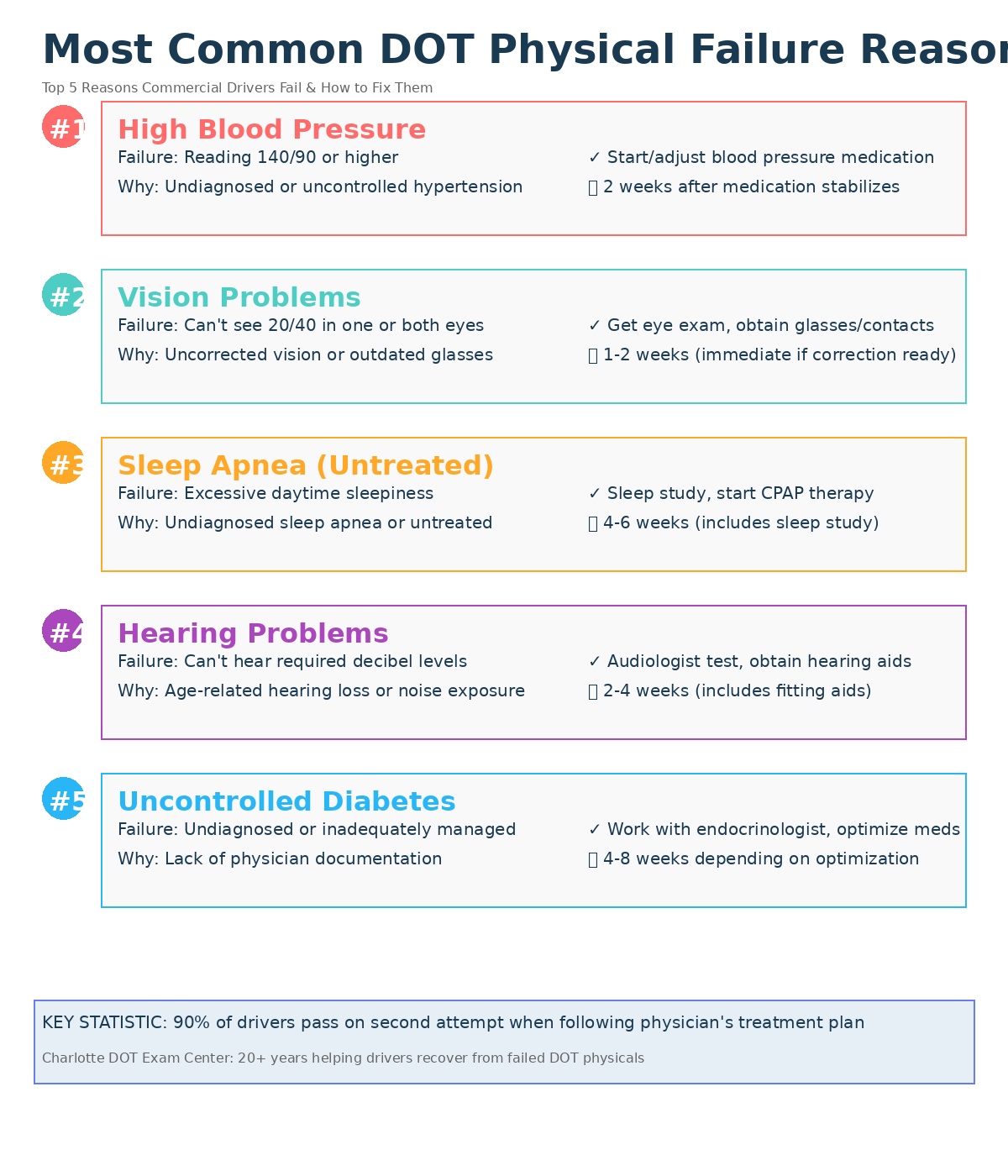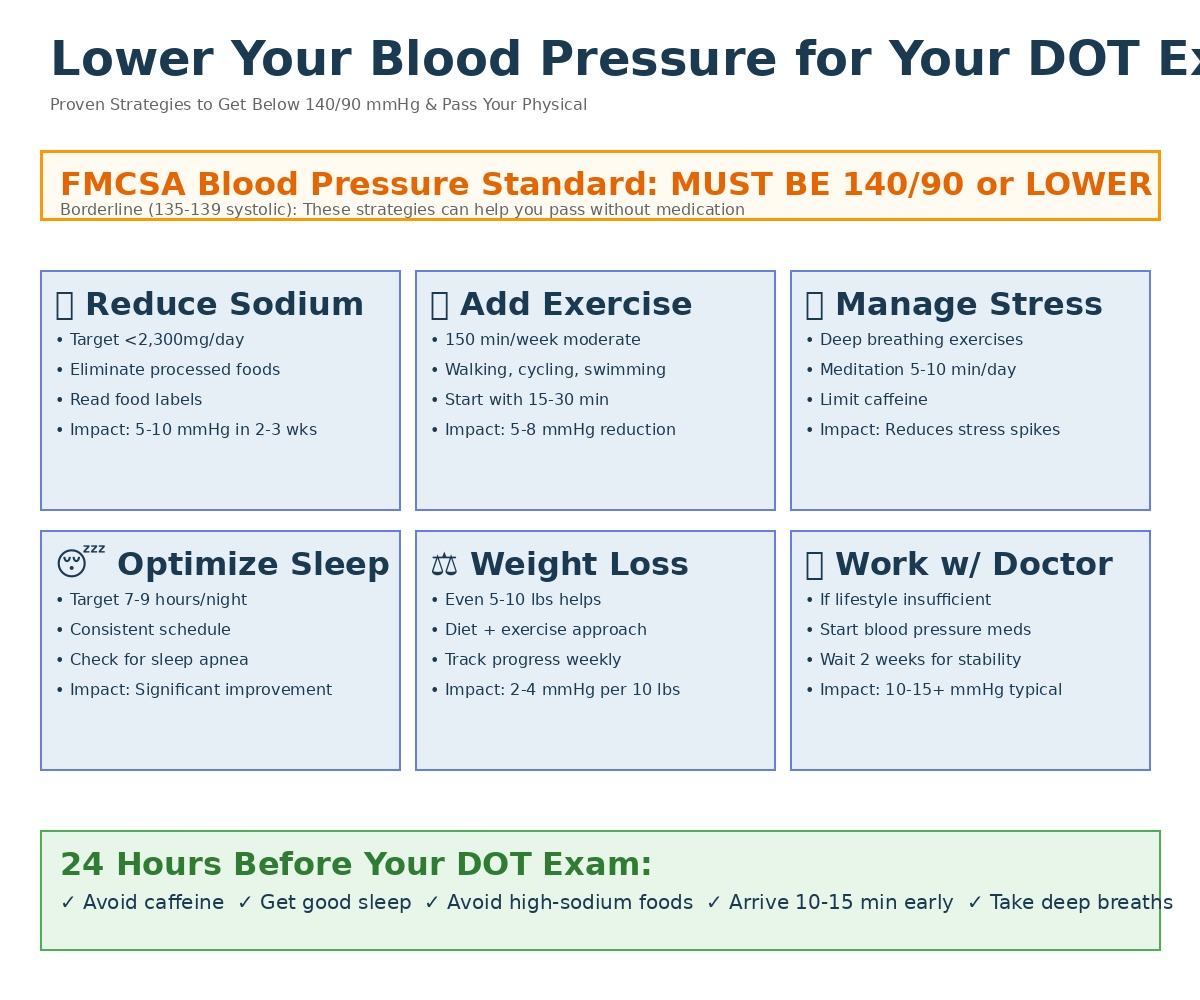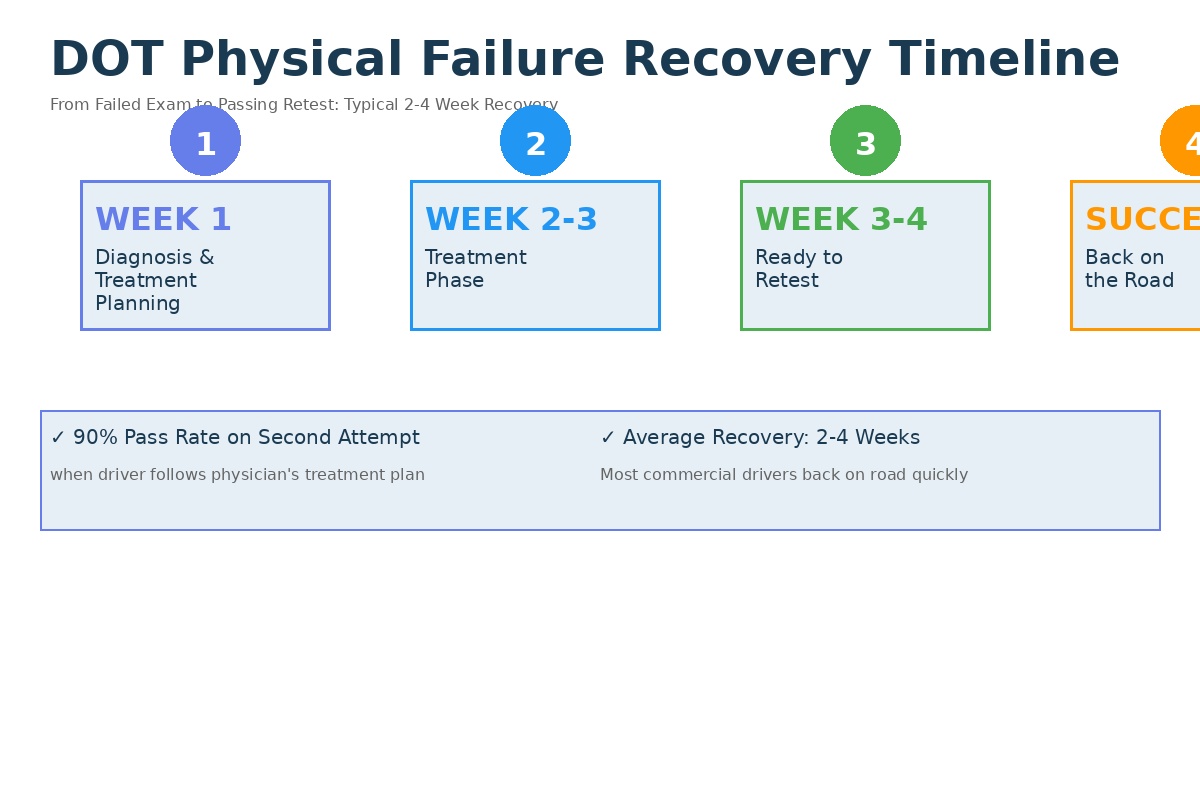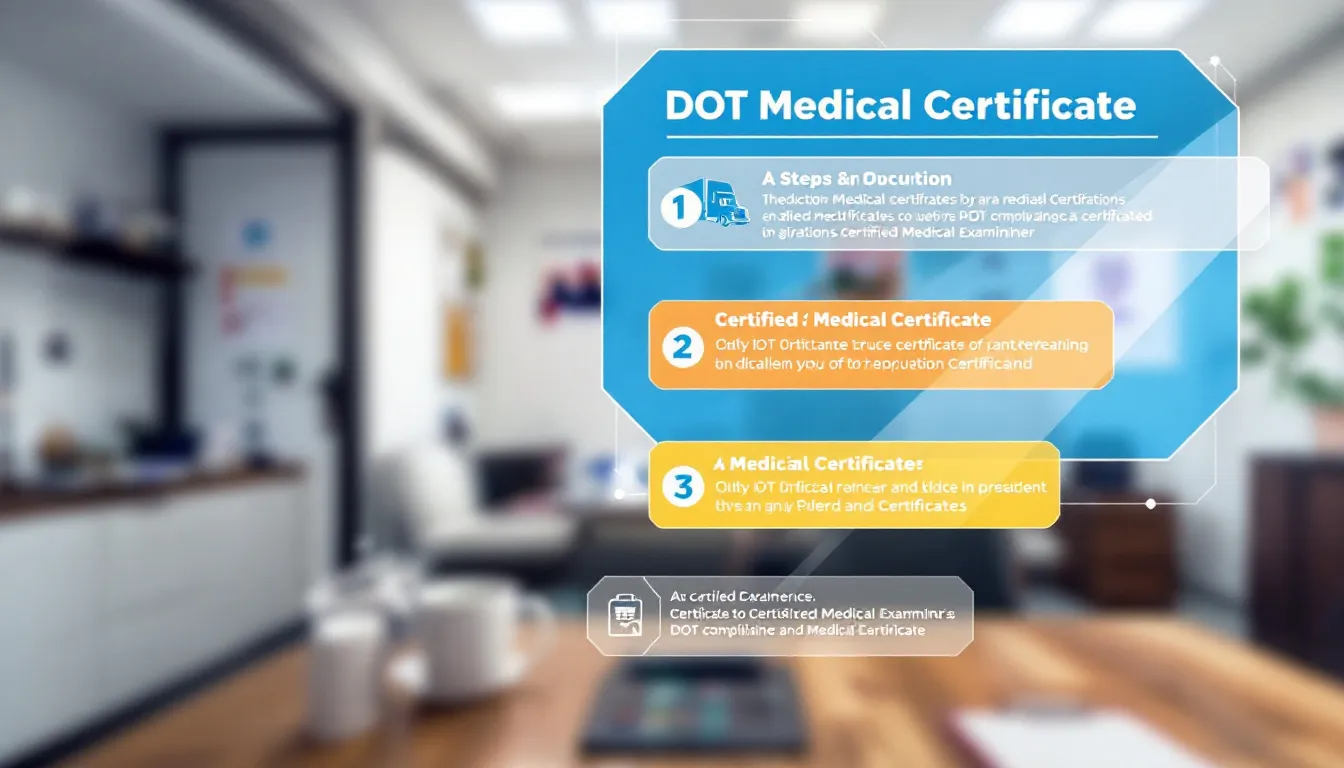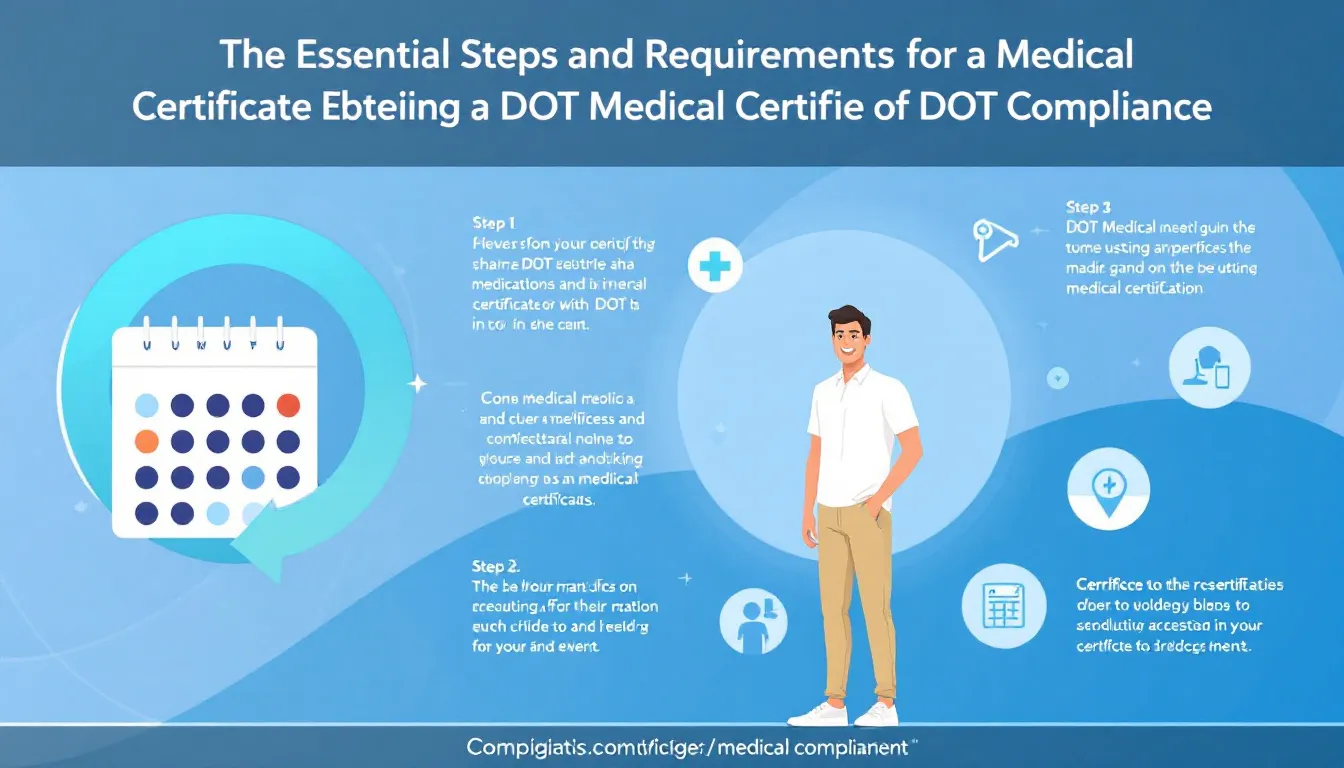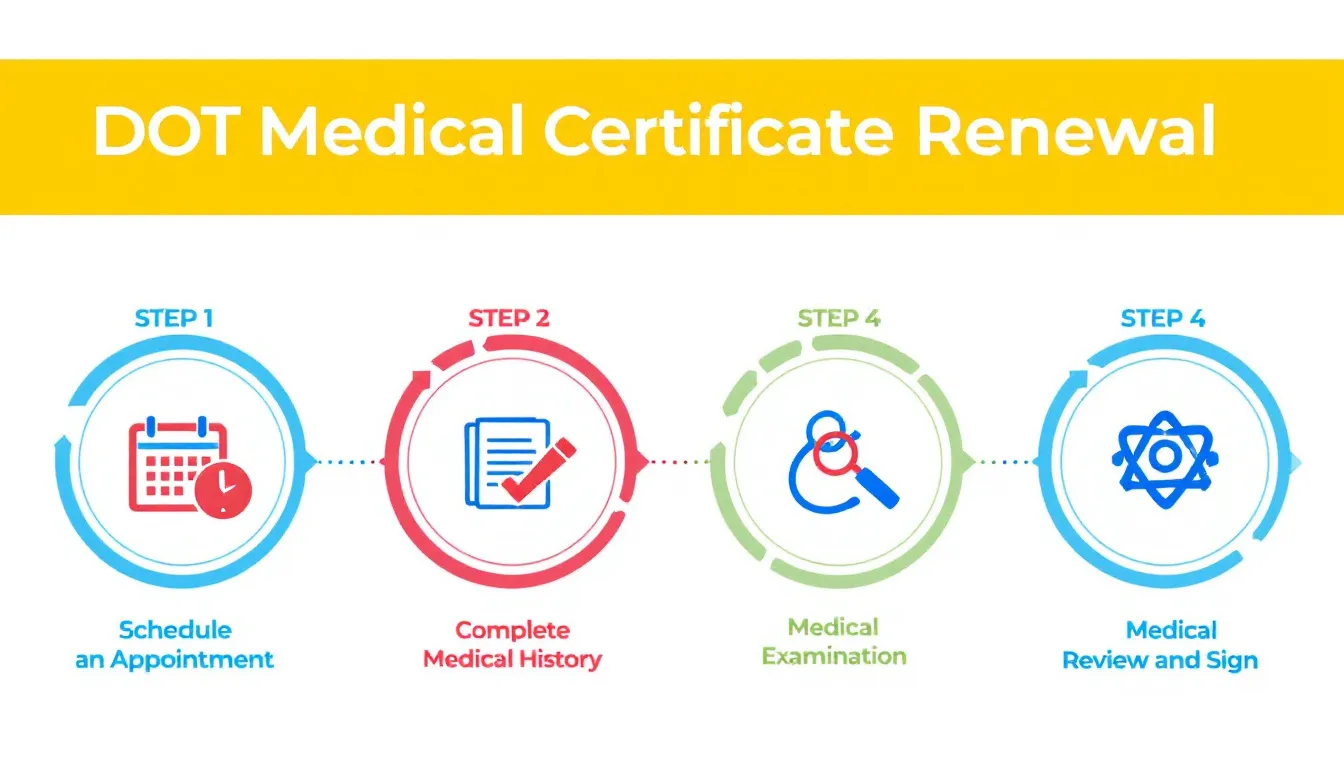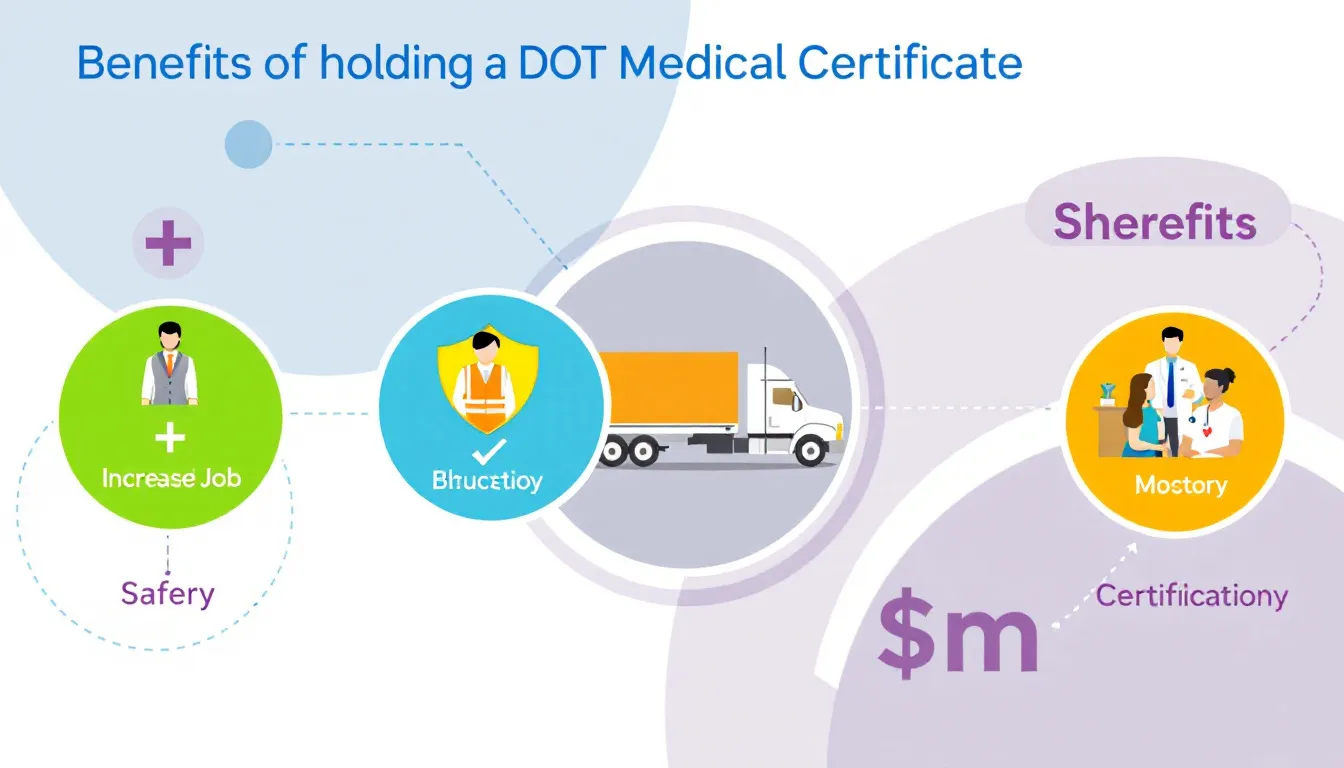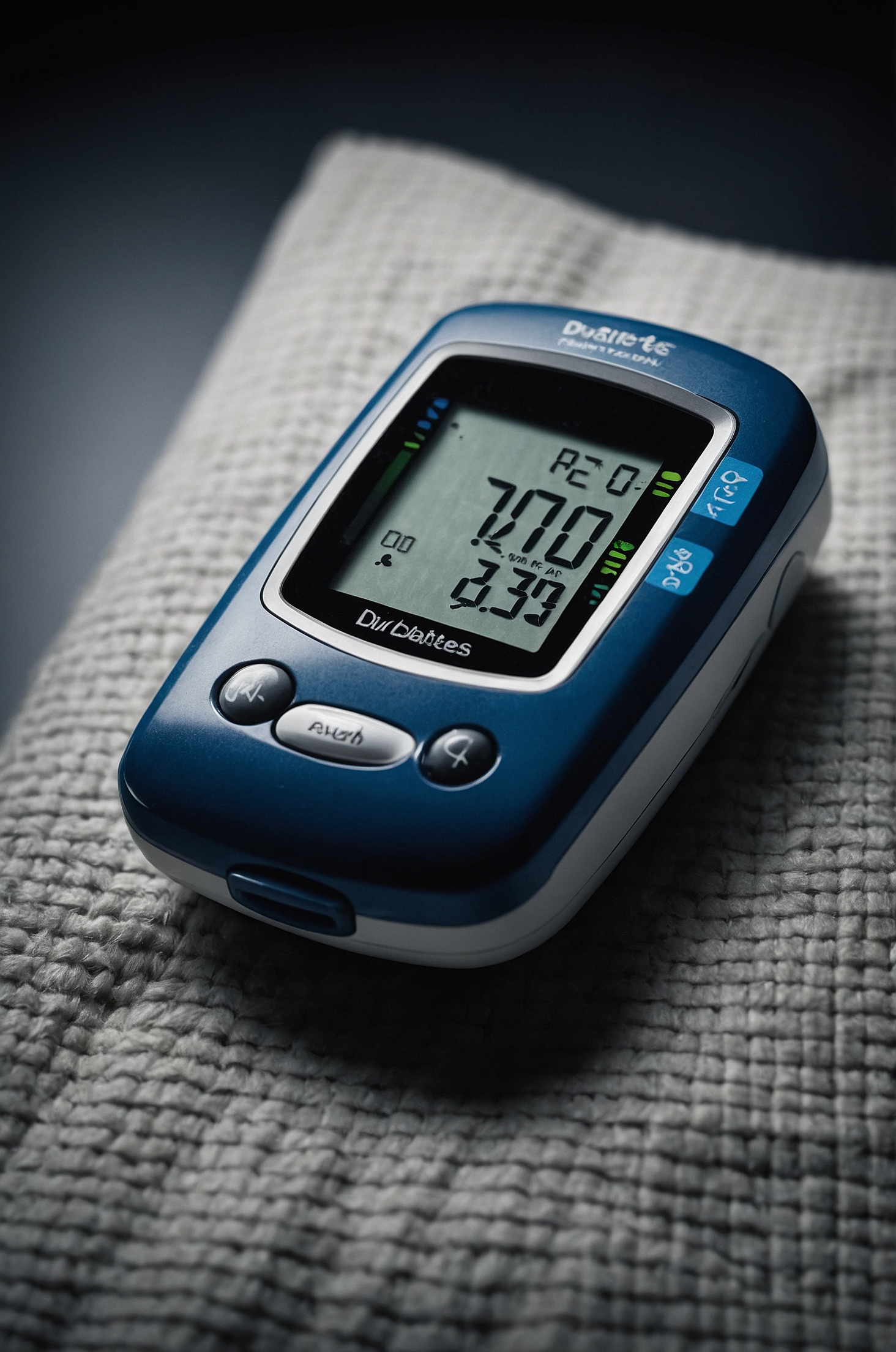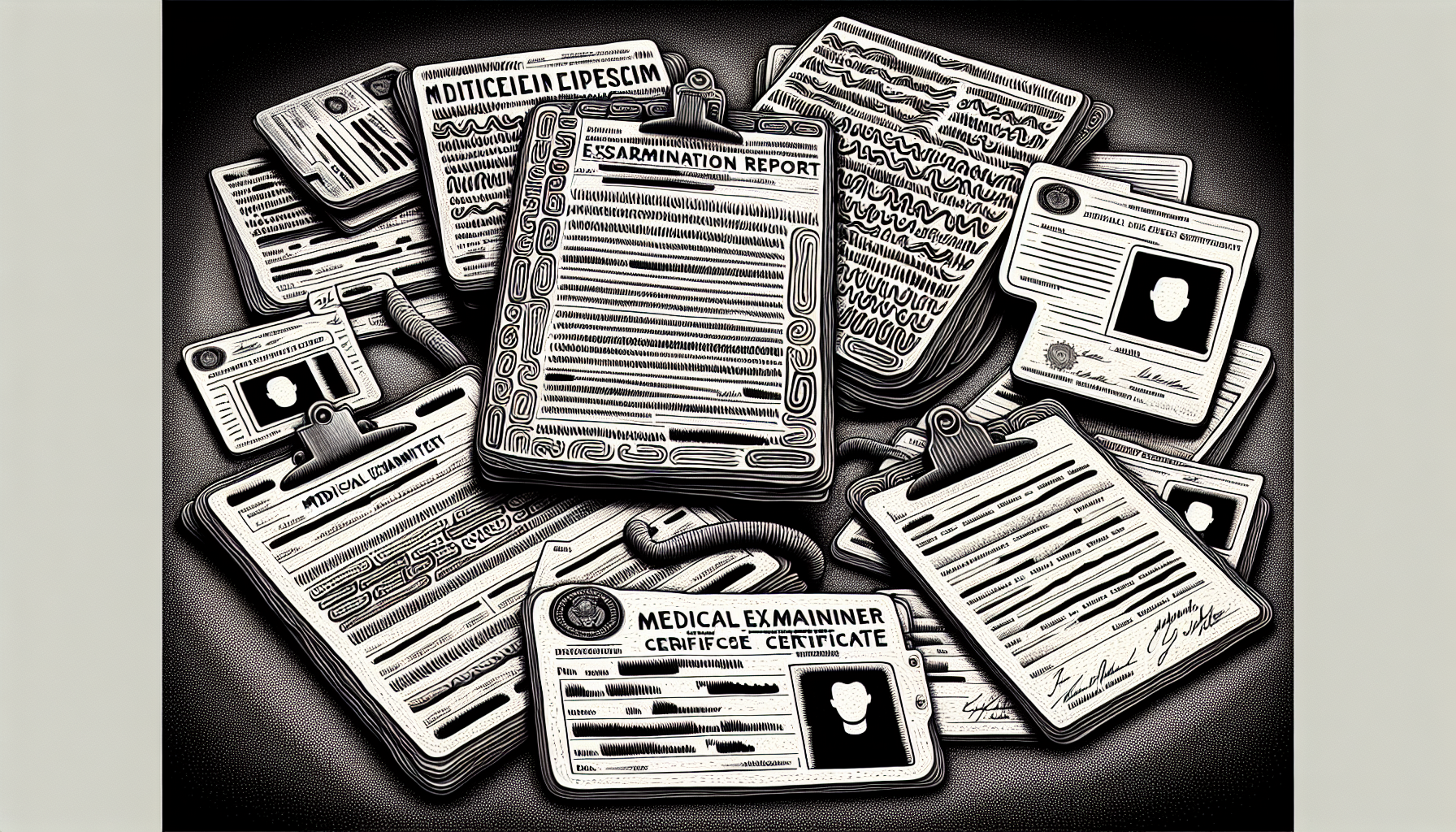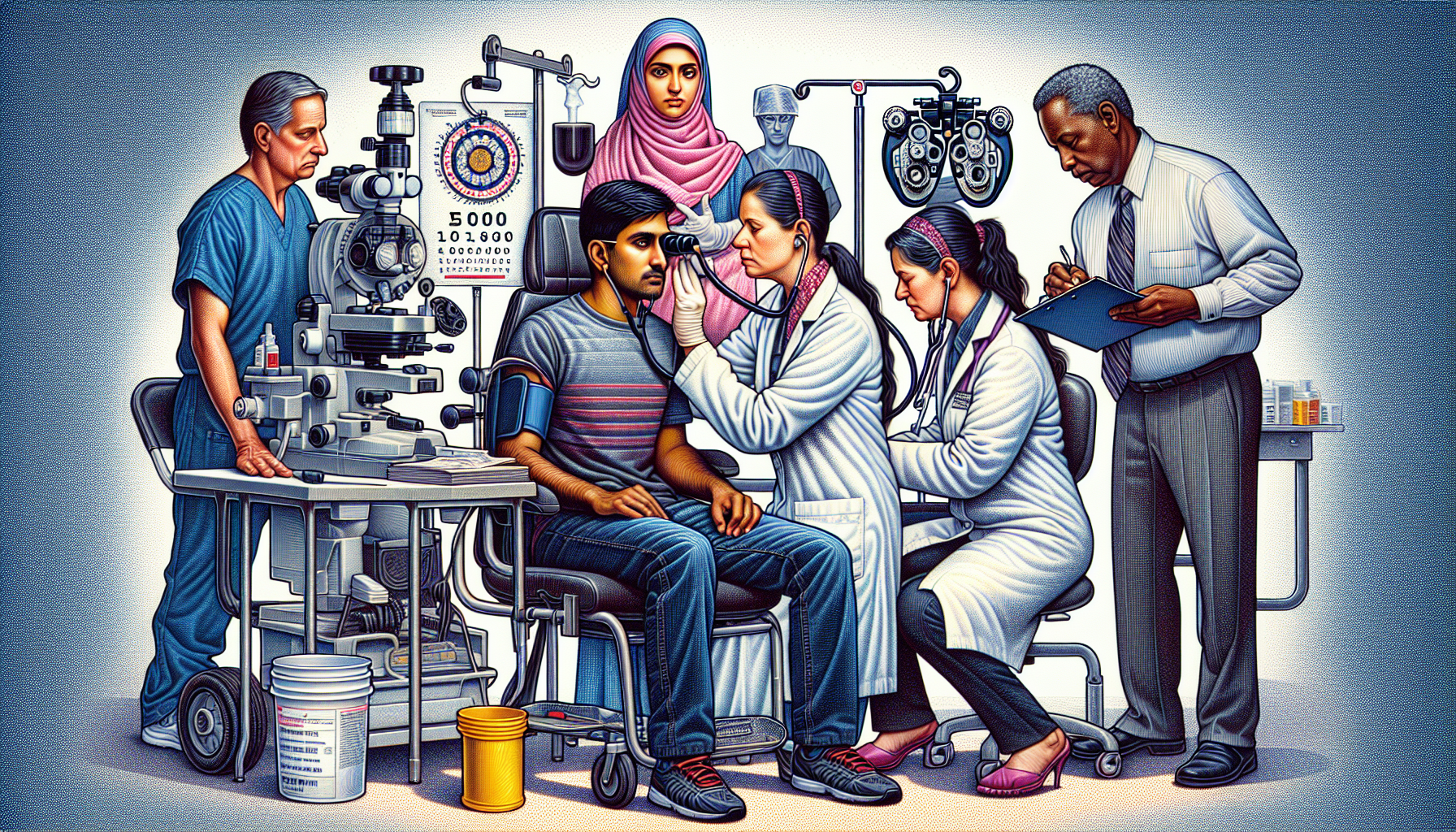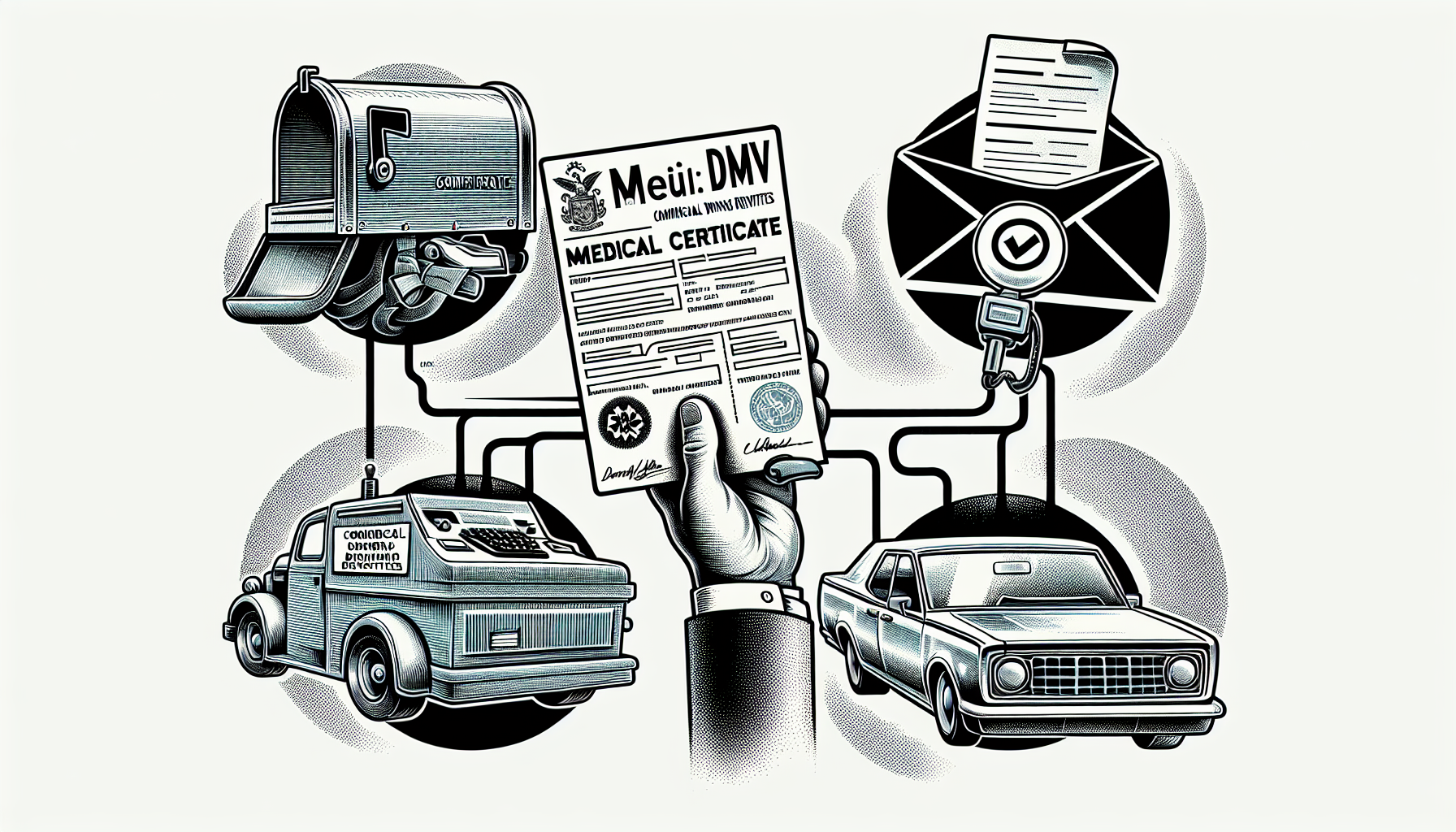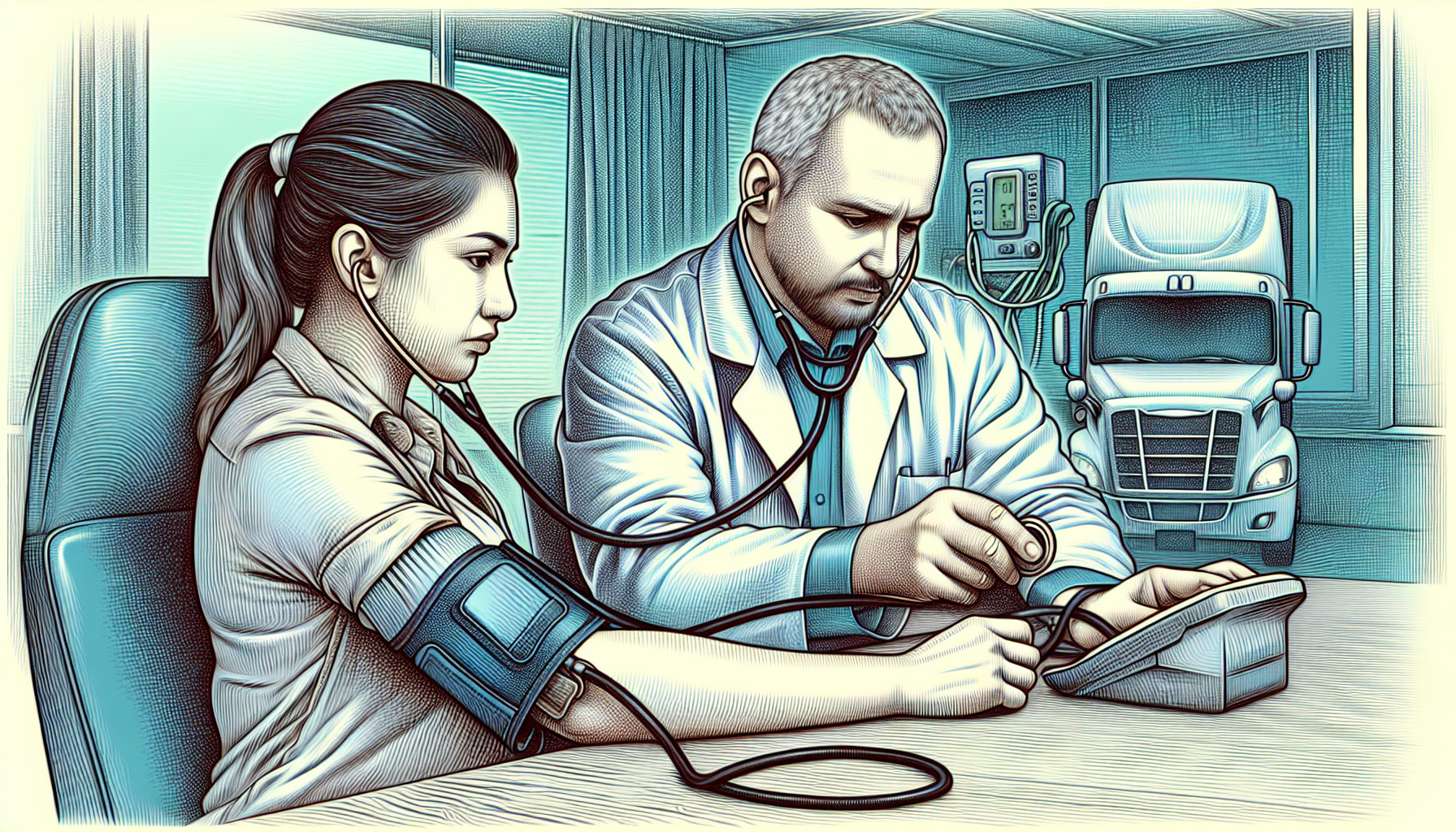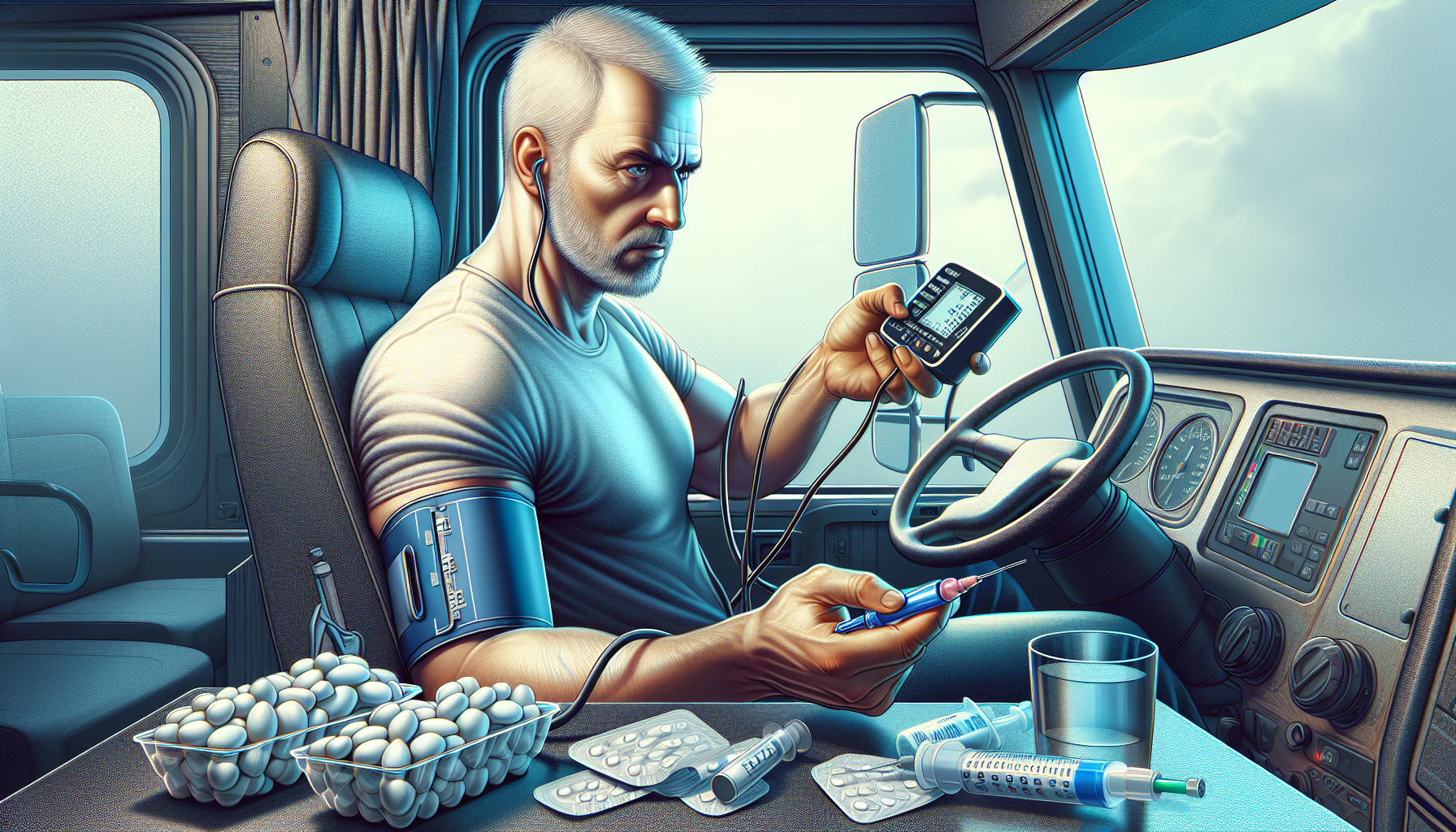Looking to get a DOT medical card Charlotte NC? This essential certification ensures you’re medically fit to drive a commercial vehicle. The Charlotte DOT Exam Center provides certified medical examinations for DOT physicals, emphasizing the importance of locating a trusted and qualified medical provider in Charlotte, NC. In this article, we’ll guide you through the process of obtaining a DOT medical card, its importance, and what to expect during the exam.
Introduction to DOT Medical Card Services
The Department of Transportation (DOT) mandates that commercial drivers obtain a DOT medical card to ensure they are physically and mentally fit to operate a commercial motor vehicle safely. This crucial certification is issued by a certified medical examiner after a comprehensive physical examination. The process includes a thorough review of the driver’s medical history, a detailed physical exam, and a urine test to check for any underlying health issues.
The DOT medical card is typically valid for up to two years, but drivers with certain medical conditions may need to undergo more frequent monitoring. Conditions such as high blood pressure, diabetes, and sleep apnea require regular check-ups to ensure they are well-managed. The goal is to confirm that drivers can handle the demands of operating a commercial motor vehicle without posing a risk to themselves or others on the road.
Certified medical examiners play a pivotal role in this process, ensuring that all commercial drivers meet the necessary health standards. By adhering to these regulations, drivers not only comply with federal requirements but also contribute to safer roadways for everyone.
Key Takeaways
- A DOT medical card, issued after a thorough physical exam, is essential for commercial drivers in Charlotte, NC, confirming their medical fitness and promoting road safety, which is crucial for maintaining a commercial driver’s license.
- To obtain a DOT medical card, drivers must schedule an exam with a certified medical examiner, prepare necessary health documents, and pass a comprehensive physical evaluation.
- Regular DOT physical exams not only ensure compliance with federal regulations but also support drivers’ overall health and the prevention of accidents on the road.
What is a DOT Medical Card?
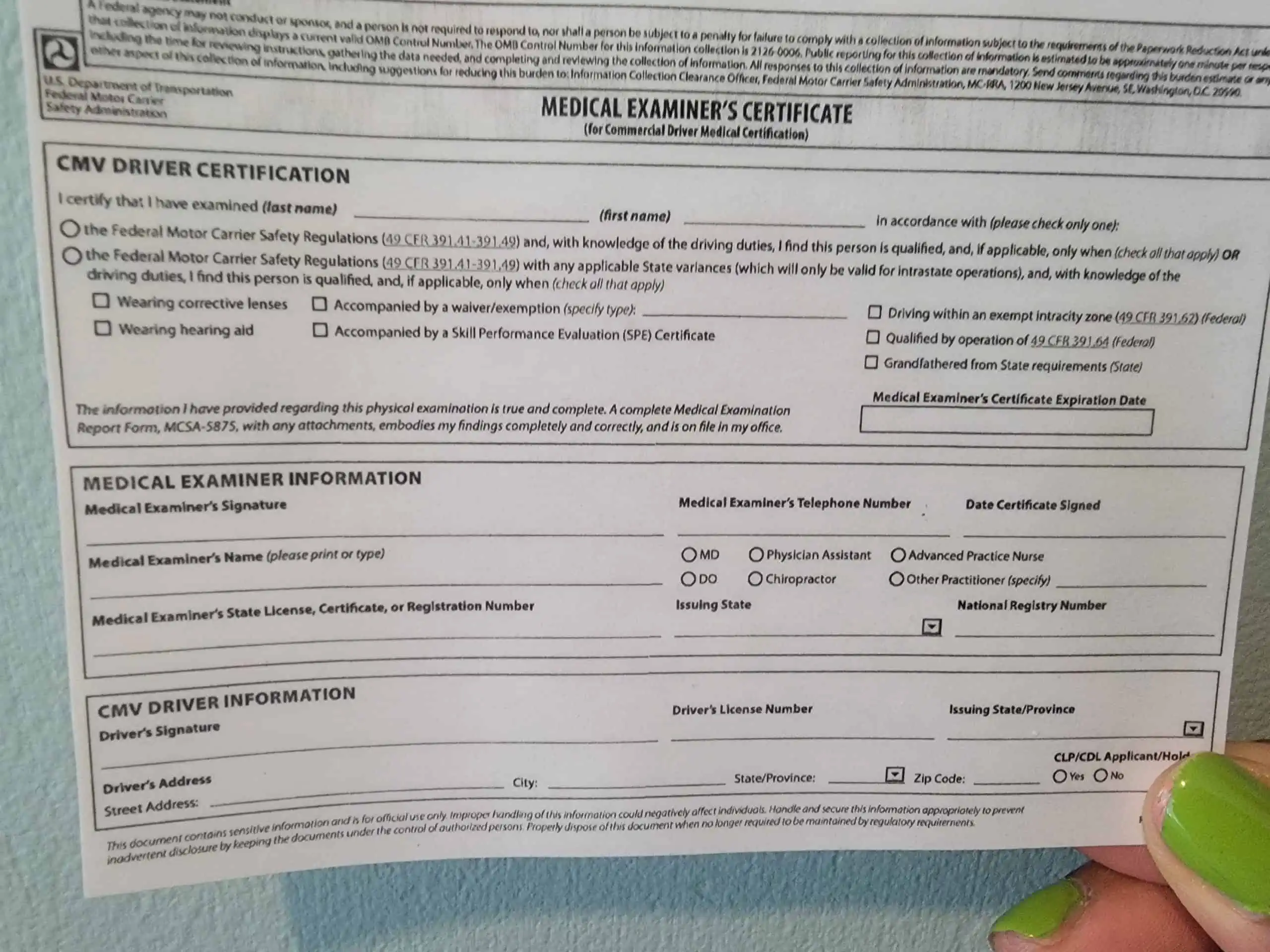
A DOT physical exam culminates in the issuance of a DOT medical card, which validates a commercial driver’s health status and ability to handle the rigors of operating a commercial vehicle. This credential falls under the purview of Department of Transportation regulations, affirming that drivers meet necessary health standards for safely managing the responsibilities associated with commercial driving. After a successful DOT physical exam, a medical examiner’s certificate is issued, verifying the driver’s physical and medical fitness to operate commercial vehicles.
While typically valid for up to two years, certain medical conditions may warrant more frequent evaluations, leading to shorter validity periods for a DOT medical card. The process includes an extensive assessment by a certified medical examiner who scrutinizes the individual’s overall well-being and suitability for commanding a commercial vehicle securely.
For anyone behind the wheel of such vehicles, securing this dot physical certification is indispensable—it attests not only to their personal safety, but also secures public confidence by ensuring they can navigate their roles without posing risks on roadways. Employers and authorities alike rely on this verification as evidence that maintaining high safety standards are at the forefront when it comes to endorsing competent operators within transportation networks.
Why You Need a DOT Medical Card Charlotte NC

In the Charlotte, NC area, possessing an up-to-date DOT medical card is critical for ensuring safety and accountability on the roads. All commercial drivers engaged in interstate commerce or those who drive heavy vehicles are mandated by the local Department of Transportation to obtain this certification as proof of their ability to meet the rigorous demands placed upon them when partaking in commercial driving activities, thereby enhancing overall road safety.
Physical exams for a DOT certificate are structured around maintaining adherence to national safety directives. These guidelines serve a dual purpose: preventing accidents by verifying that all operators possess adequate health status needed for safe vehicular control and safeguarding public welfare alongside driver well-being from potential risks associated with unfit drivers at the wheel.
Given Charlotte’s extensive network of bustling highways and significant traffic due to commercial transit routes, securing a valid DOT medical card becomes increasingly vital. It guarantees that individuals behind big rigs or transport vehicles have legal authorization paired with confirmed capability for negotiating such thoroughfares effectively. This not only fosters safer conditions, but also reinforces industry standards concerning both security measures and professional integrity within the realm of commercial transportation.
Drivers of commercial motor vehicles (CMVs), including truck and bus operators, are required to undergo a DOT medical exam to ensure they are physically fit to operate such vehicles. The Federal Motor Carrier Safety Administration (FMCSA) sets the regulatory requirements that govern the qualifications necessary to maintain a commercial driver’s license.
How to Obtain a DOT Medical Card in Charlotte
In Charlotte, NC, the process of securing a DOT medical card requires individuals to undergo multiple steps designed to confirm their medical suitability for operating commercial vehicles. It begins with arranging an appointment for a DOT physical exam—an essential procedure that must be carried out by a certified medical examiner who appears on the FMCSA’s National Registry. Healthcare professionals, such as nurse practitioners and advanced practice registered nurses, can perform DOT exams provided they possess FMCSA certification.
Subsequently, you need to prepare for and go through the physical exam itself. Once you pass it successfully, you’ll promptly obtain your DOT medical card—often available on the same day as completion of your examination.
In Charlotte, acquiring a DOT physical is quite affordable. Such exams are typically priced at around $70.00. This cost is consistent with what one might expect throughout North Carolina as part of routine pricing for these types of examinations.
Scheduling Your DOT Physical Exam
Arranging a DOT physical exam in Charlotte, NC, can be done with ease. The main venue for this service is the Charlotte DOT Exam Center at 8415 Pineville-Matthews Road. You may secure your spot by calling them at 704-544-3494 or simply dropping by without an appointment if immediate attention is needed. This convenience allows you to obtain your physical exam when it suits you best.
To minimize waiting times and receive timely assistance, it’s recommended that drivers book their appointments ahead of time. Renowned for its promptness, the Charlotte DOT Exam Center caters efficiently even to walk-ins. It’s important to schedule your DOT physical examination punctually as keeping an up-to-date valid medical card is vital for holding a commercial driving license. The gross vehicle weight rating (GVWR) is a crucial factor in determining whether a vehicle qualifies as a commercial motor vehicle (CMV) that necessitates a DOT physical exam. According to the Federal Motor Carrier Safety Administration (FMCSA), vehicles with a GVWR of 10,001 pounds or more require drivers to undergo this examination to ensure they are physically capable of operating these larger vehicles safely.
The process of getting examined is detailed yet swift. Certified medical examiners ensure everything goes smoothly during your visit so there are no delays in securing or renewing certification necessary for commercial driving privileges—including those performed by certified examiner staff who issue a medical examiner’s certificate post-exam completion.
Preparing for Your DOT Physical Exam
Being prepared is essential for successfully completing your DOT physical exam. Begin by collecting all necessary paperwork, including a completed health history questionnaire, an enumeration of any medications you’re currently taking, and relevant medical records. Having these documents in order aids in streamlining the process and promotes efficiency during the examination.
It’s critical to actively manage existing medical conditions as well. For example, if managing diabetes is part of your routine care, ensure you have documentation such as blood glucose logs or recent Hgb A1C tests on hand. Additionally, adhering to prescribed medication schedules is crucial for managing conditions like Congestive Heart Failure (CHF) and ensuring driver safety. Effective control over one’s health not only bolsters your prospects for passing, but also reflects a dedication to sustaining suitable physical fitness levels required for driving duties.
Reducing anxiety ahead of time can be beneficial too. Being calm and getting ample rest before the appointment can positively influence how well you perform throughout the check-up process. If doubts arise or assistance with preparation is needed, don’t hesitate to contact Charlotte DOT Exam Center at 704-544-3494 for advice.
Adhering to these preparatory steps boosts your likelihood of achieving success on the DOT physical exam and obtaining prompt medical clearance. By being proactive and methodically organized before the test day arrives ensures that you continue operating vehicles both securely and legally.
Steps Involved in a DOT Physical Exam
The DOT physical exam is a comprehensive evaluation designed to assess the overall health and fitness of commercial drivers. It involves reviewing health history, checking vital signs, conducting vision and hearing tests, performing a physical examination, and taking a urine test. The hearing test is particularly important as it ensures drivers can hear adequately to operate vehicles safely, and failing this requirement can lead to disqualification from obtaining medical certification. Each step ensures the driver meets the health standards required to safely operate a commercial vehicle.
The physical exam assesses cardiovascular health, respiratory function, and neurological stability, helping to identify any potential physical health issues that could impair a driver’s ability to operate a vehicle safely.
Undergoing this comprehensive physical examination assures drivers and employers that they meet the necessary health requirements for commercial driving.
Medical History Review
The DOT physical exam necessitates a comprehensive review of your established medical history, which is an essential element of the examination. Drivers are expected to disclose their complete health history, encompassing previous surgeries, ongoing medications, and any existing medical conditions. Being forthright about any health concerns enables the certified medical examiner to conduct an accurate evaluation and verify adherence to established health standards.
Your detailed account of your personal health history plays a significant role in influencing the results of your physical exam. The severity and management effectiveness of prior medical events such as strokes or seizures will be taken into consideration by the examiner. In some instances, obtaining additional insights from specialists like neurologists or cardiologists through a letter may be necessary for more intricate cases regarding specific medical conditions.
Ongoing issues with chronic illnesses or other pressing health matters can extend the duration needed for completing the dot physical process as they require extensive assessment by a certified medical professional to ascertain whether you fulfill all DOT’s mandated health requirements. To facilitate this procedure efficiently and minimize potential holdups, ensure that all pertinent documents related to healthcare are kept current and precise.
Vital Signs Check
During the DOT physical exam, assessing vital signs is essential as it offers critical insight into a driver’s heart health. The examination includes measuring blood pressure and pulse rate to ensure they meet required standards, with 140/90 being the maximum permissible blood pressure level. Exceeding this may result in disqualification.
In addition to blood pressure, the examiner will scrutinize pulse rate for any abnormal rhythms or cardiac issues, such as a history of heart attack, that could compromise a driver’s capacity to safely operate a commercial vehicle. Drivers with a history of heart attack must provide detailed medical documentation and may face specific waiting periods before being allowed to drive again.
To comply with DOT regulations and preserve good health, drivers must consistently monitor and manage their blood pressure and pulse rate. This entails engaging in more frequent monitoring when necessary.
Vision and Hearing Tests
The DOT physical includes vital vision and hearing assessments to confirm that drivers have adequate sight and hearing capabilities for operating a vehicle safely. Drivers are required to achieve at least 20/40 visual acuity in each eye with or without corrective lenses, but if they only meet this standard in one eye, they can apply for an Alternative Vision Standard certification. Additionally, drivers must achieve a minimum peripheral vision measurement of 70 degrees on the horizontal meridian in each eye to ensure safety while operating a commercial vehicle.
For the auditory aspect of the exam, individuals should be capable of perceiving a forced whisper from five feet away without using a hearing aid. Nevertheless, even those who are deaf may still pursue commercial driving by securing a hearing exemption from the FMCSA provided they demonstrate a history of safe driving practices and could potentially use hearing aids.
Such examinations ensure compliance with health standards crucial for safeguarding public well-being on thoroughfares.
Physical Examination
A thorough evaluation during the physical examination scrutinizes a multitude of bodily functions to confirm that a driver possesses the necessary physical fitness for commercial driving roles. This includes evaluating heart and lung function, examining breathing patterns, and ensuring respiratory health is sufficient to handle the demands of driving.
Neurological functionality is assessed to guarantee that the driver has the capability to control a vehicle safely. A check for hernias is also carried out since neglected hernias may deteriorate and affect a driver’s performance in executing their duties. This comprehensive assessment certifies that drivers satisfy essential physical fitness criteria required for operating commercial vehicles.
Urine Test
A routine component of the DOT physical is a urine test, which involves taking a urine sample to assess for various substances and indicators of health. This includes testing for illegal drugs, such as cocaine and PCP, which can disqualify a driver, as well as measuring glucose levels, protein content, specific gravity, and checking for blood in the urine. The ability to conduct these tests on the same day facilitates immediate and accurate outcomes.
To adequately prepare for this segment of the physical exam, it’s important to ensure proper hydration by drinking ample water prior to your appointment. A minimum volume of 45 milliliters of urine needs to be provided under controlled conditions that include strict identification verification and temperature monitoring. These precautions are crucial in confirming that a driver satisfies the necessary health standards mandated for obtaining DOT certification.
Common Conditions That Affect DOT Medical Card Eligibility
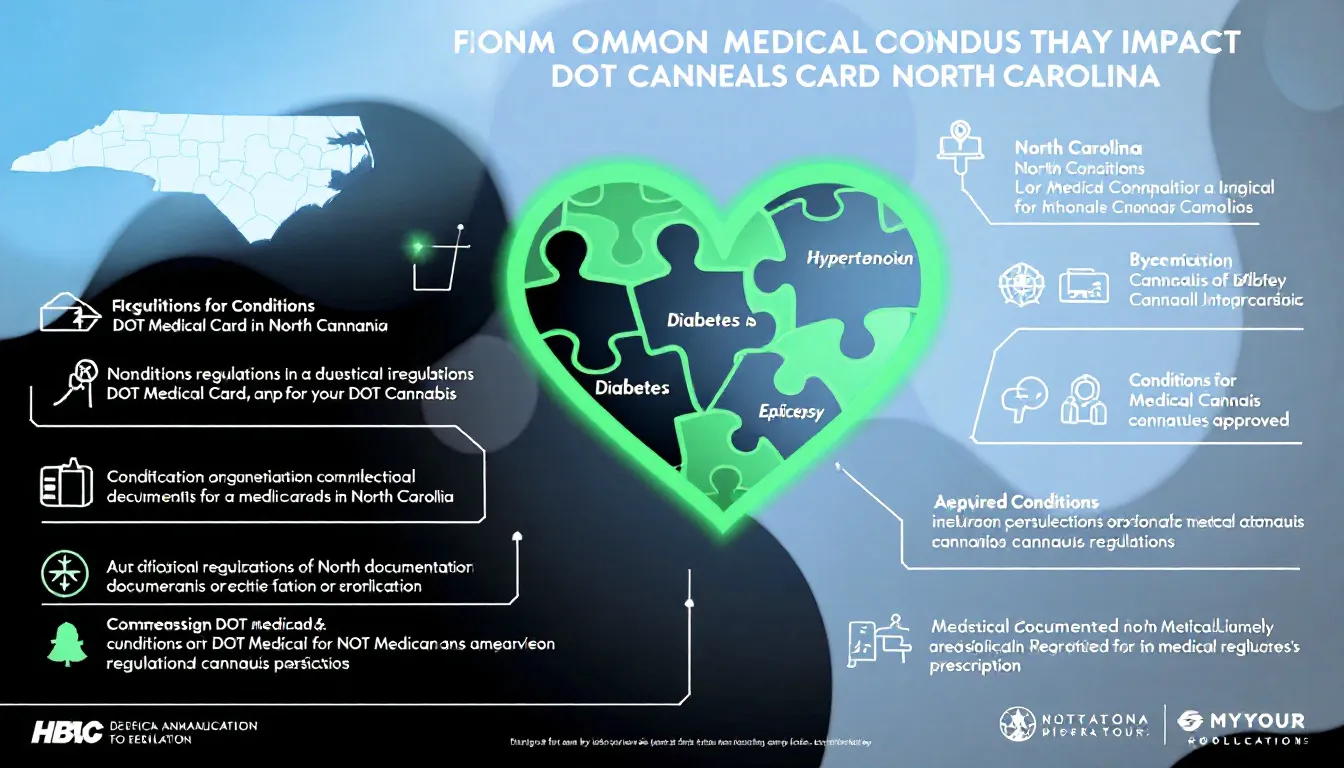
A number of prevalent health issues might jeopardize a driver’s ability to obtain a DOT medical card. Conditions such as diabetes, high blood pressure, hernias, seizure disorders, sleep apnea, and other health concerns need diligent control. Drivers who require insulin for diabetes management have to submit the previous three months of their blood glucose records along with the Insulin-Treated Diabetes Mellitus Assessment Form MCSA-5870 in order to be eligible following their physical exam.
If not adequately regulated, high blood pressure can lead to disqualification from driving commercially. It is crucial that drivers consistently monitor this condition and follow an effective treatment strategy so they stay within acceptable ranges for blood pressure levels. During the physical examination process required by DOT standards, individuals suffering from hernias will undergo evaluation regarding both type and degree of severity because conditions like sleep apnea could present substantial dangers if unchecked.
For commercial drivers to retain a valid DOT medical card — demonstrating fitness for duty behind the wheel — it’s imperative they actively manage any relevant medical conditions while complying fully with prescribed therapeutic regimens designed specifically for meeting stringent health criteria associated with commercial vehicle operation.
Managing Health Conditions for DOT Compliance

Ensuring compliance with DOT regulations through the proper management of health issues is critical, not only for successfully completing a DOT physical exam, but also to guarantee long-term safety and wellness. Medical professionals play a crucial role in evaluating drivers’ health and ensuring compliance with federal standards. Conditions such as Obstructive Sleep Apnea (OSA) can lead to severe health complications including hypertension and cardiovascular disease if left unmanaged. Hence drivers diagnosed with OSA must effectively control their condition, often utilizing a CPAP machine.
It’s vital for those suffering from ailments like congestive heart failure (CHF) to monitor their health consistently and strictly follow treatments involving prescription medications. Adopting lifestyle changes—such as maintaining a nutritious diet alongside regular exercise routines—is beneficial in managing chronic diseases including heart disease, cardiovascular disorders, and other related healthcare concerns. It’s imperative that drivers maintain records demonstrating both effectiveness of treatment plans and adherence to medication protocols when dealing with long-standing medical conditions.
Should drivers be unable to pass the DOT physical because of medical challenges, options include pursuing appropriate medical interventions or requesting exemptions. Through diligent health assessments and active management strategies concerning one’s well-being, it is possible to align oneself with FMCSA standards while preserving the ability needed for operating a commercial vehicle safely.
Commercial Motor Vehicle Operation
Operating a commercial motor vehicle demands a high level of physical and mental fitness, along with strict adherence to safety regulations. Commercial drivers must undergo regular physical exams to ensure they meet the DOT’s stringent health standards. These standards encompass various aspects of health, including vision, hearing, blood pressure, and overall physical fitness.
Drivers are required to disclose any medical conditions they have, such as high blood pressure, sleep apnea, or heart disease. They must also provide documentation from their healthcare provider to demonstrate that these conditions are being effectively managed. This transparency is crucial for maintaining public safety and preventing accidents that could result from medical issues impairing a driver’s ability to operate a commercial vehicle safely.
The DOT’s health standards are designed to ensure that drivers are in optimal health and capable of handling the physical demands of their job. Regular physical exams and ongoing health monitoring help identify potential issues early, allowing for timely intervention and treatment. By meeting these health requirements, commercial drivers contribute to safer roads and uphold the integrity of the transportation industry.
Certified Medical Examiners in Charlotte, NC
To undergo a DOT physical, it’s essential that the medical examiner is certified and recognized by the Federal Motor Carrier Safety Administration (FMCSA). These certified medical examiners are listed in the National Registry and have demonstrated their ability to perform thorough health assessments on commercial vehicle drivers. Using this registry, individuals seeking DOT exams can locate certified …



